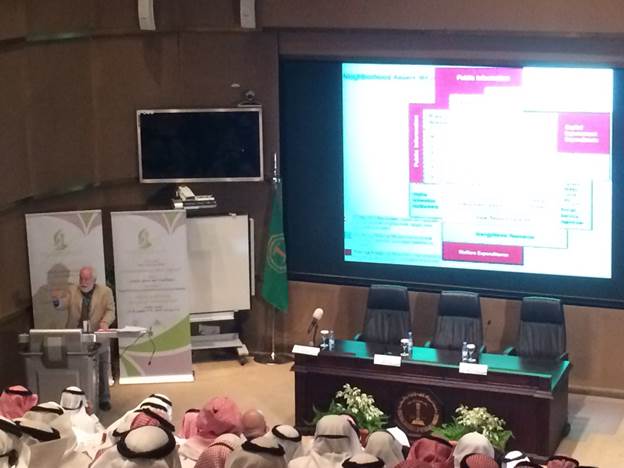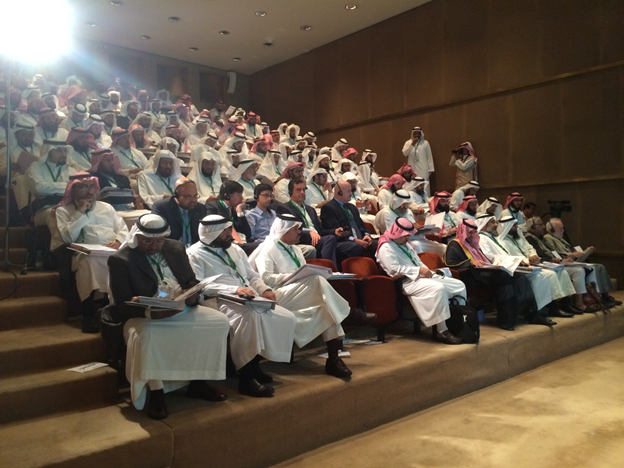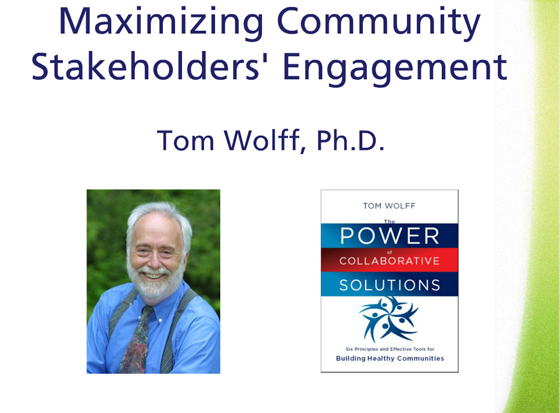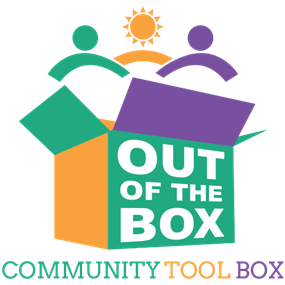Contents of Winter 2015 Collaborative Solutions Newsletter:
A new issue packed with resources. Including:
- The Emerging Non Profit World in Saudi Arabia: A Promising Glimpse :Tom Wolff’s recent consultations and keynote in Khobar, Saudi Arabia
- “Community Psychology Practice: Expanding the Impact of Psychology’s Work “ Award paper by Tom Wolff in the American Psychologist for winning the American Psychological Association’s Award for Distinguished Contributions to Independent Practice
- Two new free webinars from Tom Wolff: Coalition Building and Community Engagement
- The Community Tool Box‘s Out of the Box Prize
- Coalition Coaching: A new service from Tom Wolff & Associates
- New Clients at Tom Wolff & Associates
The Emerging Non Profit World in Saudi Arabia: A Promising Glimpse :
Tom Wolff’s recent consultations and keynote in Khobar, Saudi Arabia


The Emerging Non Profit World in Saudi Arabia: A Promising Glimpse
The email arrived out of the blue in June of this year. The email was titled, “Invitation to speak at top Saudi NPO Conference!” They were inviting me to give a keynote address in early November at the annual non-profit conference at King Fahd University of Petroleum and Minerals in Khobar in the Kingdom of Saudi Arabia. I was baffled – how did they find me? Why did they want me? What were they asking of me?
The last question was made clear in their email: “Knowing you are an expert, academic and consultant in the field of community development, we would like to invite you to speak at our conference and give a keynote presentation about community development and the role of the non-profit sector in light of the roles of the other two sectors (public, business).”
So, over the next few weeks and months we talked, emailed and negotiated the topic and content of my talk. Ultimately it was titled: Enhancing Collaboration Across Government, Business and Non Profits: Building Healthy Communities in Saudi Arabia. Throughout that time I wondered what they really wanted from me, what was awaiting me, and what was happening in Saudi Arabia. I let them know that all my community development work and healthy communities work is based on core principles of democracy and was that going to be okay to discuss in the Kingdom of Saudi Arabia (KSA)? They reassured me that it would be fine. So, I proceeded with their support to acquire a visa and booking flights etc.
I read a few books on visiting Saudi Arabia and started to learn about the country as best I could from here in the US. I learned about the ‘religious police’ who enforce the wearing on burkas for women. I watched a wonderful Saudi movie, Wajdja, (from a female director) about a girl wanting to ride a bike (not acceptable). I checked out the websites on “women driving in Saudi Arabia” – which states that this is the only country in the world where women can’t drive. I learned that a large percent of the Saudi work force (especially lower level jobs) were performed by foreigners (ie 1.5 million from the Philippines). I read on the visa application that violations of Saudi drug laws were punishable by death. I was fascinated and remained baffled.
I was told that there are 1400 non-profits in Saudi Arabia, 700 of them being Islamic teaching organizations. That leaves 700 doing the work that non-religious non-profits do here in the US. That’s not many non-profits, I imagine we have 700 non-profits just here in western Massachusetts.
They later informed me that on top of the keynote they also wanted me to offer a 6 hour workshop on the actual ‘how to’s’ of community development and to consult on some of their projects while I was there --- it was going to be a busy visit.
Just before leaving, I learned of the amazing roster of presenters that they had lined up for this two day event: Bunker Roy and Meagan Carnahan of the Barefoot College in India; Iqbal Quadir from MIT focused on inclusive ventures in low income countries ie. Grameenphone in Bangaladesh; Aaron Hurst on the Purpose Economy and Pro Bono as a Powerful Solution; Rodrigo Baggio of Brazil Center for Schools on Digital Inclusion in Rio’s favelas; Tony Meloto who builds sustainable communities in slum areas in the Philippines, Farm Village Universities; Robert Ashcroft from Arizona State University on Creating and Sustaining Non -profit Workforce; Michael Grogan from Calgary, Canada on Workforce development in non-profit sector;, and Stephen Brien from England on Social Impact Bonds. This was a much more fascinating line up of speakers than I have heard at a US non-profit conference in decades.
Most of them were much more prominent on the global scene than I was ie. Bunker Roy one of “ the 100 most influential people in the world” and Rodrigio “top leader in South American to watch” both by Time Magazine. But as my visit evolved it became clear that my host, Salem Aldini (a professor of mechanical engineering), was planning to develop a Non Profit Institute at King Fahd University and to launch community development projects across the country starting with a few pilots. This was my area of expertise.
So I began to understand that I was chosen as someone who could convey specific processes and tools for their hand- picked audience of 150 non- profit and family foundation leaders. I could also expose them to tools in the Community Tool Box (ctb.ku.edu) which is translated into Arabic.
During my four days I began on day one by working with a small group consultation with the faculty who would be the facilitators in my upcoming six hour workshop, gave the kick off keynote address, followed by an afternoon discussion session. Then, two days later, a consultation to the teams planning the community development pilot and another team working on youth interventions who were looking for innovative ways of assessing youth needs. Finally I delivered a six hour workshop to a small hand chosen group of 35 non- profit and foundation leaders. It was a workout for them and me.
The Saudi faculty, foundation and non- profit leaders whom I met with in the small group consultations were very serious about trying to bring community development innovations to the Saudi non- profit and foundation world. They asked lots of questions, took lots of notes. Clearly, they were most curious about this work. This is startling in light of the repression and limited practice of democracy in Saudi Arabia. We often got to the point in a discussion, especially when talking about evaluation and documentation, where they said that although the government collects data it is generally unavailable to those in the university, foundation and the non-profit world.
In one small group I did learn of people working at the community level bringing the three sectors (business, government, non- profit) together to address crises over the last few years such as: the flooding in Jeddah, the influx of Kuwaiti refugees after the Gulf War, and helping female teachers get transportation to work.
The second class citizenship of women was always present in our discussion. The keynote audience was all male in the auditorium, while the talk and slides were also shown in a separate conference room to the women. At the buffet breakfast one morning a woman in full burka addresses me – she was a participant in the other room – liked my talk but complained about Bunker’s Barefoot College because it took the Grandmas away from villages to become solar engineers. Why not take the men? She is Secretary General of the International Islamic Women’s Association. I asked if it was alright for me to sit with her for breakfast (I was fascinated). Although, she said ‘yes’, when I sat down she spent all her time of the cell phone – so I assumed it was not really acceptable and I moved.
A few people attending the conference explained to me that Mohammed both worked and prayed side by side with his wife – so that the precedent for the separation of the women was not really clear.
Of course, in most cultures, to my knowledge women do the core community building work , often below the radar. That has been true in almost all my community development and coalition building work in the US. But in KSA, it is tricky to build coalitions because men and women have to be separate – we were deep into a conversation about a planned model community development project in a limited geographic area (a city neighborhood) when I asked whether we would be able to mobilize the men and the women together – I was told “no”, that it would be two separate but coordinated efforts – mind boggling to an American community builder.
But interestingly enough, at 9 PM in my workshop all of a sudden a number of the men left – I was later told that they had promised their wives that they would be home by 9 PM!
Religious questions often surfaced during my visit. In almost all the question and answer sessions there would be statements about what the Koran said. Often these questions were not really questions but some statement of Islamic teachings that might or might not relate directly to what had just been said. Many of the Saudis were eager for us to leave with a better understanding of Islam. To that end, we were presented with copies of the Koran and a six set DVD set on understanding Islam.
My workshop was entitled “Enhancing Collaboration with Government Business and Non Profits – A workshop on Tools and Processes for Success.” It included an overview of collaboration, and the five key principles of collaborative solutions from my book (The Power of Collaborative Solutions). I helped them take a view of non-profit functions beyond individual, remedial work done by professionals and to expand to working with families, tribes, the whole society and going beyond remediation to include prevention, development and empowerment as legitimate non-profit functions. This seemed to be an important expansion of scope for them. We covered planning tools such as: coalition start up and planning, SWOT Analysis, visioning, force field analysis, developing a road map, barriers, tools for engaging the community and finally collaborative leadership. The Community Tool Box was demonstrated. The participants were eager to engage with all the material but it was hard to tell exactly how much they would actually take back with them and use. Doing an English/Arabic bilingual workshop for 35 participants over six hours with two breaks for prayer was a new experience for me. Having all the worksheets translated into Arabic was wonderful but it made it impossible for me to indicate which was the appropriate page. They all seemed to humor me as we proceeded, and I will be anxious to see the evaluations. The informal feedback after the workshop was very positive.
Some startling other learnings:
- English is the official language at King Fahd University (and also in the Saudi business world), KSA was described jokingly as the 51st US state.
- The average size of a Saudi Family Foundations was said to be $10 Billion!
- The warmth and hospitality of the Saudis was remarkable. People were always offering to help and sincerely interested in our well- being during the stay. One afternoon my very accommodating host, Ahmad, was going to take me to a store where we could buy dates to take back to my family. We went to the nearby mall but it was closed for prayer, so as we were leaving we saw two men having a cup of coffee (or Arabic tea). Ahmad asked them for a recommendation of a store and directions and they had a lengthy chat. We then went to find Ahmad’s car, but just like in the US who can find their car in a Mall’s parking lots? About five minutes later one of the men we had just talked to came running up. He had thought of a better date store for us to go to. Amazing hospitality!
So what did I bring home?
I loved the adventure and foreignness of the whole experience in a totally different culture.
I was excited by the opportunities that Salem Aldini has opened up for a developing non-profit world in KSA
I am eager to help in the next phases of their progress. Many participants indicated that they were eager to have me come back – but in all honesty I am not sure that that wasn’t just Arabian hospitality and warmth. On the other hand, Salem informed me that he arranged for my visa to be good for five years (the visa is in Arabic so I have no idea what it says) – so maybe I will return. I would enjoy that.
Also, I was able to reflect on how my enthusiasm for the future of non-profits in KSA did not match my experience of the non- profit world in the US in 2014. Here, I see the non- profit world becoming increasing conservative, become averse to risk, and to sticking their neck out and naming the issues that stare us in the face (racism, economic inequality, etc.). Maybe we in the US can re-capture that sense of adventure that comes from an emerging non-profit sector – but I am not sure what will make that happen.
Tom Wolff, December 2014
“Community Psychology Practice: Expanding the Impact of Psychology’s Work “ Award paper by Tom Wolff in the American Psychologist for winning the American Psychological Association’s Award for Distinguished Contributions to Independent Practice

This August at their Annual Conference in Washington DC the American Psychological Association presented their Award for Distinguished Professional Contributions to Independent Practice to Tom Wolff Ph.D. Nadine Kaslow, the President of APA, presented the citation that read as follows:
"Thomas J Wolff is a nationally recognized consultant working with individuals, organizations and communities. His practice anchored in the values of social justice and collaboration, has focused on building strong communities and by doing so strengthening the wellbeing of people within them. His work has had a profound and enduring impact on American society. He pioneered the concept of local community coalitions, which have become national models for community-based health and humans serve delivery. He has advanced public recognition of psychology as a profession and provided the bedrock for what we now term "community-engaged scholarship"
Then in November of 2014 The American Psychologist published Tom’s biography, publication highlights, and his award acceptance paper entitled Community Psychology Practice: Expanding the Impact of Psychology’s Work. Read the article here.
Two free webinars are now available
Maximizing Community Stakeholder Engagement a webinar developed for CityMatch for Maternal Child Health programs.
In this webinar Tom carefully goes through the rationale for engaging those most affected by the issues into your work, and then lays out a step by step method that will lead to successful recruitment and retention.
http://webmedia.unmc.edu/community/citymatch/DataTraining/CommunityDimensionsofPractice/player.html

Consultation on Coalition Building and Collaborative Solutions a webinar developed for the Society for Research and Action:
In this webinar Tom goes through the material, power points and exercises that he employs in a typical coalition building workshop and explains both the material and the rationale behind the material.
The Community Tool Box ‘s Out of the Box Prize

The Community Tool Box is celebrating its 20th anniversary by hosting an Out of the Box Prize to honor innovative and promising approaches to promoting community health and development happening in communities worldwide. The Grand Prize winner will receive $5,000 USD. We hope you will submit your own application and video, and share the contest information with others.
Eligibility and Selection Criteria
Groups engaged in building healthier and more just communities during the last three years can apply. This may include efforts to improve community health, education, urban or rural development; or to address poverty, the environment, or promote social justice. Applicants must be willing to have their group’s efforts shared via the Community Tool Box.
We are seeking to honor “out of the box”—innovative and high impact — approaches to bringing about change and improvement in communities. “Innovation” may include a unique or effective way of bringing about change, generating or using existing resources, or generating participation and advocacy for change. We seek clear descriptions of how applicants took action in the community; including Assessment, Planning, Taking Action, Evaluation, and Sustainability of the group’s efforts.
Awards and Selection Process
Grand Prize: $5,000 cash award (USD)
Second Prize: $3,000 cash award (USD)
Award Finalists: Applicant stories will be shared via the Community Tool Box. Judges will select approximately 10 Finalists, whose stories will be posted on the Tool Box home page. Site visitors will vote on the Finalists to receive the top two prizes.
Key contest dates:
April 30, 2015: Deadline for submission of applications
May 1 – June 30, 2015: Application review to select Finalists
August 1, 2015: Award Finalists posted on the homepage of the Community Tool Box; public voting begins
October 1, 2015: Public voting on Award Finalists closes
October 15, 2015: Grand Prize and Second Prize announced and awards given
New Service from Tom Wolff & Associates - Coalition Coaching
Tom Wolff is now available for hour long coaching sessions. This is the perfect service for coalition coordinators, chairs, or members who are struggling with their coalition. This is a convenient low cost way of addressing your coalition's challenges. If you are facing any of these difficulties or others contact us.
- Wasting too much time?
- Too much talk with too little action?
- Can’t keep members engaged?
- Your coalition is losing momentum?
- Your coalition is not creating meaningful community change?
To contact Tom to set up a coaching session call me at 413 253 2646 or email at tom@tomwolff.com. Sessions can be either in his office or on the phone
What is new at Tom Wolff & Associates - New clients
The Coalition to Prevent ADHD Medication Misuse - www.cpamm.org We have helped Shire Pharmaceuticals and Tierney Communications to develop this new coalition to address this critical issue on college campuses.The coalition is a diverse group of organizations with representation from the medical community (American Academy of Family Physicians), mental health advocacy groups ( CHADD and the Jed Foundation), college administrators (NASPA), college student leaders (BACCHUS) and the pharmaceutical community (Shire).
King Fahd University of Petroleum and Minerals – Annual Non Profit Conference (see story above).
United States Breast Feeding Coalitions – did a workshop for this old client on community engagement for their annual meeting.
Connect to Protect – National HIV Program – webinar on sustainability
LaCrosse Wisconsin Healthy Communities Team – webinar on sustainability
Tom Wolff, Ph.D., is a globally recognized consultant, coach and trainer on coalition building and community development. He has a lifetime of experience training and consulting with organizations, and communities across North America and around the world. He is a community psychology practitioner committed to issues of social justice and to building healthy communities through collaborative
solutions. Tom has published numerous resources to help communities solve their own problems. His
most recent book is The Power of Collaborative Solutions‐ Six Principles and Effective Tools for Building Healthy Communities. He presently runs Tom Wolff & Associates (www.tomwolff.com). Consulting clients include federal, state, and local government; foundations; hospitals; nonprofit organizations; professional associations; and grassroots groups. This summer Tom received the Distinguished Professional Contributions to Independent Practice Award from the American Psychological Association.. He was educated at Clark University (B.A.) and the University of Rochester (Ph.D.).
Page Top
